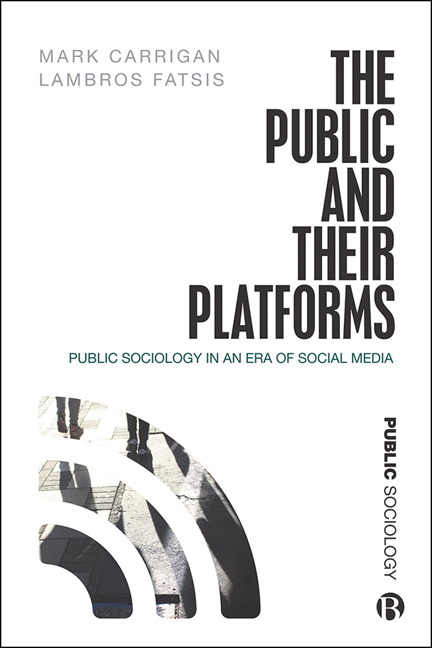Book contents
- Frontmatter
- Contents
- Acknowledgements
- Series Editors’ Preface
- Introduction
- 1 Defining ‘the Public’
- 2 The History of Platforms
- 3 Between Publics and Platforms
- 4 Sociology and its Platforms
- 5 The Past, Present and Future of Public Sociology
- 6 Making Sociology Public
- 7 Making Platforms Public
- 8 Assembling Public Sociology
- Notes
- References
- Index
1 - Defining ‘the Public’
- Frontmatter
- Contents
- Acknowledgements
- Series Editors’ Preface
- Introduction
- 1 Defining ‘the Public’
- 2 The History of Platforms
- 3 Between Publics and Platforms
- 4 Sociology and its Platforms
- 5 The Past, Present and Future of Public Sociology
- 6 Making Sociology Public
- 7 Making Platforms Public
- 8 Assembling Public Sociology
- Notes
- References
- Index
Summary
What does public sociology mean in an era of social media? Many answers to this question see social media as providing new tools for public sociology, promising the expansion of sociology's reach by communicating its insights to vast audiences. This book argues that such a response engages only superficially with what social media can and cannot contribute to public sociology, offering little insight about media platforms and their impact on sociology's scholarly and public expression. Worse still, much of the public sociology debate is remarkably silent on the question of what ‘the public’ is, means, or how it should be brought about. This leaves it ill equipped to account for how shifts in the means through which social life is mediated influence processes of public formation and the publics which ensue from such processes (Marres 2012). In the following chapters we attempt to address this deficit in order to reconstruct public sociology for an era of ubiquitous platforms. But first it's necessary to account for what ‘the public’ is and what it means to be public. In seeking to provide an answer, this chapter is a necessary prelude to what follows, resting as it does on our reconceptualization of ‘the public’ to discuss platforms as communication tools, while also interrogating their relationship to their users and the public context they shape and are shaped by, before concluding with our vision for a digital public sociology as a form of sociological practice that uses social media as what we call assembly devices to create public life online and offline.
In the 15-year period that public sociology has been hotly debated, its critics, sceptics and devotees have been drawn into a conceptual whirlpool of various ways with which to think about, refrain from or practise it. Astonishingly, much less of a storm has been brewing around the question of what the ‘public’ in public sociology means, or how it could be thought or brought about. Douglas Hartmann (2017: 9) perceptively pointed this out in his presidential address at the 2016 Midwest Sociological Society's Annual Meeting, where he admitted how ‘struck’ he was about ‘how little sociologists have theorized the notion of “the public” in talking about public sociology’.
- Type
- Chapter
- Information
- The Public and their PlatformsPublic Sociology in an Era of Social Media, pp. 7 - 30Publisher: Bristol University PressPrint publication year: 2021



